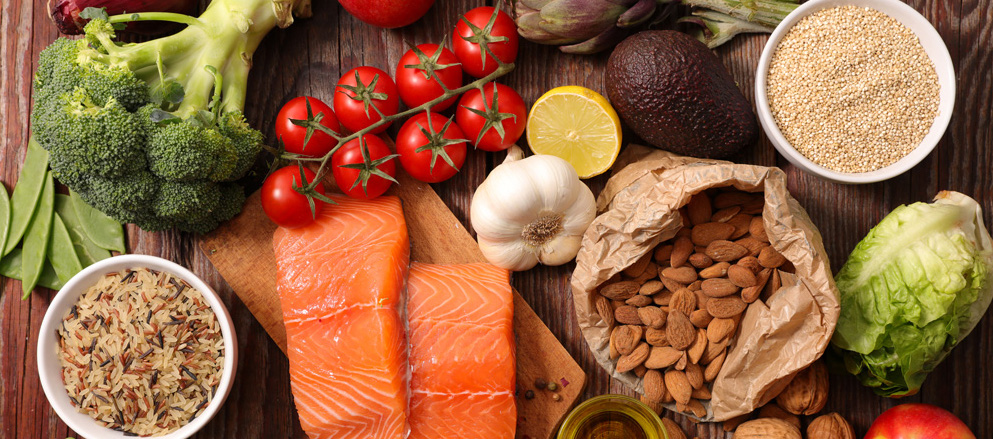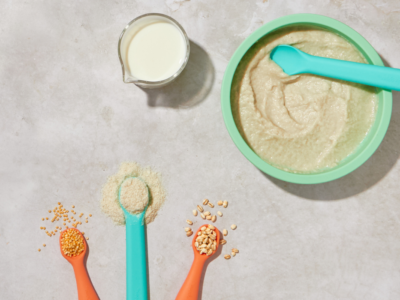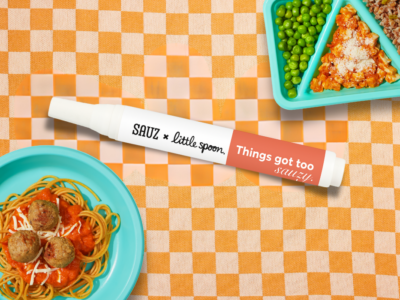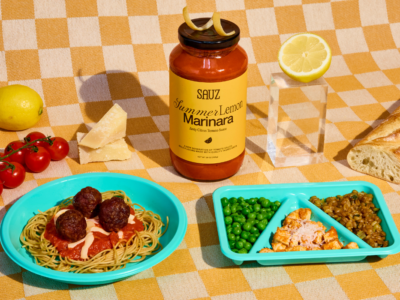When feeding your mini, it is important that you expose them to a variety of foods that boast different nutritional properties. Every nutrient plays an important role in your baby’s growth and development, but there are a few important nutrients that babies typically don’t get enough of. When transitioning to solid foods, these are a few that you may want to pay special attention to!
Omega 3 Fats
Omega-3 fats are a nutrient superstar—they’re incredibly anti-inflammatory and therefore essential in helping to build a strong immune system. Additionally, omega-3s are crucial for healthy development of the eyes, brain, and the entire nervous system.
Pro tip: Try swapping your mini’s chicken with salmon. Make sure to give it some extra delicious flavor by using ingredients like lemon, pepper and rosemary (babies like flavor!). Even if your babe doesn’t like it at first, keep trying different prep methods—it’s all about repeat exposure. It can take ten tastes to find enjoyment in a new flavor, so I encourage you to keep at it!
If your babe is still in the puree phase or you haven’t introduced animal proteins yet, avocado and flax oil are both great sources of omega-3. Little Spoon’s Avocado Green Apple Broccoli Spirulina and Carrot Apple Buckwheat Cinnamon Pumpkin Seed Flax Oil are both great, nutrient-packed options.
You may also see DHA highlighted on omega-3 supplements. There are three types of omega-3 fats: EPA, DHA and ALA. EPA and DHA are found in seafood, while ALA is found in vegetarian foods like flaxseed. DHA is the one most important for eye and brain development.
Fiber
Introducing (and re-introducing) a variety of fruits and vegetables from a young age is key to helping your baby enjoy a well-balanced diet. Not only do we as humans innately like sweet foods, but we begin life by drinking sweet liquids (aka breastmilk or formula), so that is, of course, your mini’s preference. That’s why it’s particularly important to introduce a variety of healthy foods as you help your babe build a balanced palate.
If your little one is not eating veggies and fruits, they may not be getting in enough fiber. Fiber is key for healthy digestion and blood sugar, feeling satisfied, and certain types of fiber even strengthen immunity. Not to mention, fruits and veggies are packed with other important nutrients to support immunity like vitamin C (munch on bell peppers, oranges, and broccoli) and vitamin A (think deep green or orange produce like sweet potato, carrots, and green leafy veggies).
Pro tip: Aim to include some sort of fiber at every meal and snack. So if your baby is having yogurt as a snack, mash in some raspberries too! I love Little Spoon’s fiber-rich Kale Avocado Green Apple Chia and Strawberry Basil Beet Pear Chia blends—both are great specifically designed to aid your babe’s digestion.
Iron
Iron is a critical nutrient for everyone, babies and children included. We need iron so that our body can transport nutrients and oxygen to organs and muscles throughout the body. Not to mention that it’s key for brain development. Your pediatrician should have scheduled times to check on baby’s iron levels, including at the one-year appointment. Signs of iron deficiency include pale skin, no appetite, frequent fatigue, and slowed weight gain.
There are two main types of iron: heme iron and non-heme iron in food. Heme iron is found in animal sources, like chicken, fish, beef and eggs. This type of iron is easiest for the body to absorb. Non-heme iron comes from plant-based sources like beans, green leafy veggies, and fortified cereal.
Pro tip: Non-heme iron is harder for your body to absorb than heme iron, but there’s ways you can help with absorption. Iron absorption is improved with vitamin C-rich foods. So, for instance, if you are giving your mini some steamed broccoli, add a little lemon for vitamin C (and olive oil to help absorb that vitamin A too!). Little Spoon’s Broccoli Spinach blend is almost exactly that (iron + vitamin C), pureed as a great option if your little one is just starting on solids.
Iron deficiencies are super common among toddlers—about 25% of preschool children have an iron deficiency—so it’s important to make sure your babe is getting enough iron-rich foods. While I always recommend dietary shifts as a first line of defense, some pediatricians may suggest the introduction of supplements. Little Spoon’s Wiz Kid is a great option if you’re going the supplement route as it’s made from clean, natural ingredients and comes in a tasteless powder that’s easy to mix into Babyblends or yogurt.
Vitamin D
Vitamin D is super hard to get from food. The only real food sources of vitamin D are fatty fish and some mushrooms, plus milk that is fortified with vitamin D. However, it is really hard to get enough of this vitamin solely based on what baby eats. The sun is a great way to get vitamin D, but we have to be careful about sun damage and sunscreen blocks absorption of vitamin D. Therefore, the most reliable way to get it is through supplements.
According to the American Academy of Pediatrics, the recommendation for infants up to 12 months is 400 international units (IU) daily. For children one year or older, the recommendation is 600 IU/day.
Pro tip: If you are breastfeeding, speak with your doctor about using a vitamin D supplement as your little one won’t get it through breastmilk. Once baby turns one, many parents switch from breastmilk or formula to a couple of glasses of cow’s milk daily. Note that not all cow’s milk has vitamin D added, so it’s best to speak with your doctor about supplementation. If you’re not big on dairy, sometimes alternative milks like hemp or almond can be fortified with vitamin D as well. Overall, the only reliable food source of vitamin D is fatty fish, and sometimes that isn’t even adequate depending on portion and fish, so supplements are worth exploring.
Zinc
Zinc is a key nutrient for growth and strengthening immunity—that’s why it’s often found in over-the-counter cold remedies. Because zinc is not stored in the body, it is recommended to eat foods with this nutrient daily. Zinc can be found in many foods including meat like beef and chicken, shellfish, eggs, nuts and seeds, beans, whole grains, and dairy. Phytates – found in whole grains and beans–make it harder for the body to absorb zinc from these foods. Nevertheless, both animal and plant-based sources are great!
Pro tip: Aim to include a form of protein at all of your mini’s meals and snacks as these are some of the foods richest in zinc. For example, an egg with breakfast, chicken with lunch, yogurt as a snack, and lentils with dinner. You can also turn to natural remedies to keep those sick days at bay. Little Spoon’s Sniffle Shield is a great option—it’s made with clean, all-natural ingredients like zinc, vitamins C and E, prebiotics and organic elderberry and can be easily stirred into one of their Babyblends or your little’s favorite yogurt.
It is generally recommended that we all (babies included!) consume a well-balanced diet, rich in veggies and fruit and inclusive of protein and healthy fat. Remember, we’re all different, so please speak to your baby’s pediatrician before adding in any supplements or if you have concerns about your little one’s diet.



